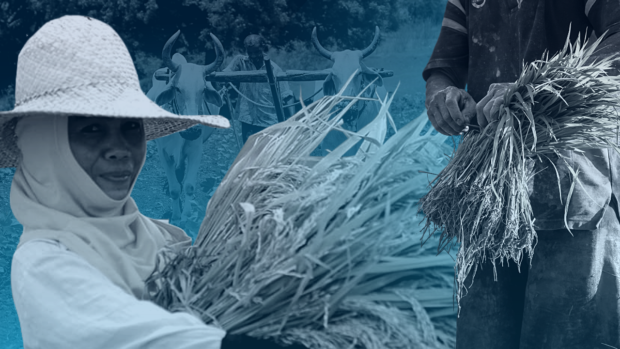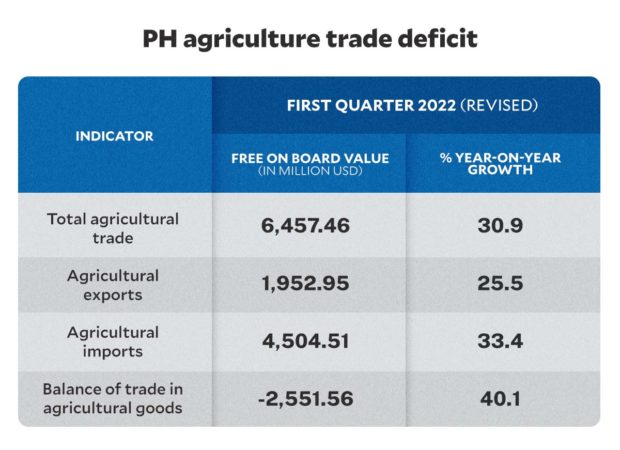MANILA, Philippines—Amid the renewed push for the Philippine Senate to ratify the Regional Comprehensive Economic Partnership (RCEP), more than 100 groups and individuals from various sectors appealed for its rejection instead.
In an open letter, 131 representatives of farmers, fishers, workers, civil society organizations, and the private sector—as well as nine notable individual signatories—urged the Senate to vote against RCEP.
RCEP is a free trade pact between all Association of Southeast Asian Nations (ASEAN) member states, as well as six of the regional bloc’s trade partners, including Australia, China, Japan, South Korea, and New Zealand.
The free trade agreement provides preferential arrangements, including market access, in all participating countries.
READ: PH joins world’s largest trading bloc
While the Senate has yet to vote on the free trade agreement’s approval, the signatories reminded lawmakers that the “lives and welfare of millions of farmers, fishers, workers and other stakeholders are at stake.”
The open letter was released almost a week after the Presidential Communications Office (PCO) disclosed that President Ferdinand “Bongbong” Marcos Jr. is pushing the Senate to ratify the regional free trade agreement, considered as the world’s biggest.
The new plea from various farmers, fishers, workers, civil society, and private sector organizations also came over a year after they expressed their opposition to the RCEP free trade agreement during the 18th Congress.
“At that time, we urged the Senate to withhold its concurrence with the treaty until the necessary policies, strategies, and programs are in place so that the RCEP benefits, and does not harm, the agricultural sector and the economy as a whole,” the groups said.
READ: RCEP: Weighing the good, bad in world’s biggest free trade pact
Deteriorating trade system
The signatories to the open letter—titled “NO TO RCEP! DON’T MAKE PHL AN ‘UKAY-UKAY’ REPUBLIC!”—noted that the promised benefits from trade liberalization following the Philippines’ membership in the World Trade Organization (WTO) in 1995 and subsequent regional and bilateral free trade agreements (FTAs) clearly “have not materialized.”
“Our trade performance has actually deteriorated. Our agricultural trade deficit has ballooned to nearly nine billion US dollars annually. Exports have not significantly expanded beyond traditional items like banana, pineapple, and coconut-based products,” the groups said.
“Meanwhile, our capacity to supply foreign markets with competitive products has paled in comparison to our neighbors. In turn, we have become a dumping ground for imports of practically all agricultural commodities—rice, corn, pork, chicken, fish, salt, onions, garlic, mung bean, peanuts, etc,” they added.
According to data from the Philippines Statistics Authority (PSA), the deficit in agricultural trade expanded by 39.6 percent year-on-year to $3.313 billion in the third quarter of 2022.
Agricultural imports grew 23.7 percent to $5.171 billion, while agricultural exports widened by only 2.7 percent to $1.857 billion.
In a position paper issued by the Federation of Free Farmers (FFF) in December 2021, the group noted that the country had experienced deterioration in the country’s trade system—which included minimal rise in exports, no expansion beyond traditional commodities, the surge in imports, and widening trade deficits—despite the trade pacts entered by the country in the past.
Things could get worse
Proponents of RCEP had assured that “there is nothing in RCEP to worry about,“ noting that “sensitive products like rice, meats, vegetables, and corn are exempted from tariff reduction.”
“In fact, what they mean is that things will probably not get any worse,” the group against RCEP said.
However, the groups believe that—with the recent huge supply gaps and price increase in sugar, onions, rice, and eggs in the country—the assurance from those who push for the free trade agreement is “of little consideration to the agricultural sector.”
READ: What we know so far about ‘out of control’ rise in onion prices
READ: The PH onion conundrum: Solutions elusive, stop-gaps at best
“Things could worsen, unless we act resolutely and fix the ills plaguing agriculture. More so, if our competitors in the region—in contrast to our complacency—continue to innovate and displace us in markets here and abroad,” they said.
“RCEP advocates insist that the trade treaty by itself is good, and that concerns about our readiness to compete should be addressed separately. For us in the agricultural sector who have experienced many broken promises of support, this proposition is unacceptable,” they added.
Former Trade Secretary Ramon Lopez previously said RCEP would play a role in boosting equitable economic growth, including for MSMEs, through the expansion of regional trade, services, and investment linkages.
Assistant Trade Secretary Allan Gepty, RCEP lead negotiator, had also detailed the benefits of RCEP for the Philippines, which could be summarized into 4Cs:
- Cheaper costs for sourcing key inputs of the manufacturing sector
- Competitiveness for Philippine industries
- Convenience for businesses in trading with key FTA partners
- Complementation of existing government support programs.
Warnings ‘exaggerated’
Several groups had noted that there has been a “conscious effort to belittle the potential damage of RCEP,” particularly on Philippine agriculture, and that the Senate has been warned that the country “will miss the RCEP bus” if the country doesn’t join now.
READ: Reject or defer decision on RCEP, over 70 agri groups urge Senate
In the open letter, the groups reiterated that dire warnings pertaining to the cost of staying out of the regional free trade agreement are “exaggerated, if not imagined.”
“Almost all the trade concessions offered by our trading partners under RCEP will remain available to us through our existing FTAs with them, either directly or through ASEAN. Foreign investors who locate their businesses in the country will continue enjoying these preferential arrangements, even if we are outside RCEP,” they explained.
“New trade or market access opportunities—if any—under RCEP cover a tiny percentage of our agricultural tariff lines and trade value. They also offer minimal tariff cuts, most of which will be phased over as long as twenty years,” they added.
The groups also stressed that if other RCEP member countries—which will enjoy the same privileges—are more competitive than the Philippines, those countries will be the gainers, while the others will be the losers.
“For industry, as with agriculture, there is a real danger of imports displacing our local output—since RCEP will eliminate tariffs on 93% of our industrial tariff lines. This could result in massive job losses and bankruptcies of small and medium scale enterprises.”
RCEP could lead to 75 percent of the Philippines’ 1,718 agricultural tariff lines to be set to zero.
According to Ibon Foundation, poverty incidence among farmers was 31.6 percent and 26.2 percent for fisherfolk—both much higher than the national average of 16.7 percent.
Preliminary results of the October 2022 Labor Force Survey (LFS) presented on December 7 last year showed that the agriculture and forestry industry lost 511,000 workers, from 9.73 million in July to 9.22 million in October.
READ: PH farms getting empty: Agriculture job loss a worrying trend
Failure to reach out
The groups also called out the proponents of RCEP for failing to reach out and find common ground for a dialogue.
“[They] had one year to engage the agri-fisheries sector to attain a mutual understanding on why our commitments under WTO and past FTAs have not worked for us. Yet, they made no serious effort to dialogue meaningfully to avoid past mistakes and to achieve real progress,” the groups said.
“This shows that the executive is taking our concerns lightly. Nor does it have a credible plan on mitigating threats and maximizing opportunities in RCEP,” they added.
TSB
RELATED STORIES:
Bongbong Marcos okay with PH joining RCEP if agri sector already competitive
Bongbong Marcos wants to ensure sufficient rice, corn, food for rest of 2022



